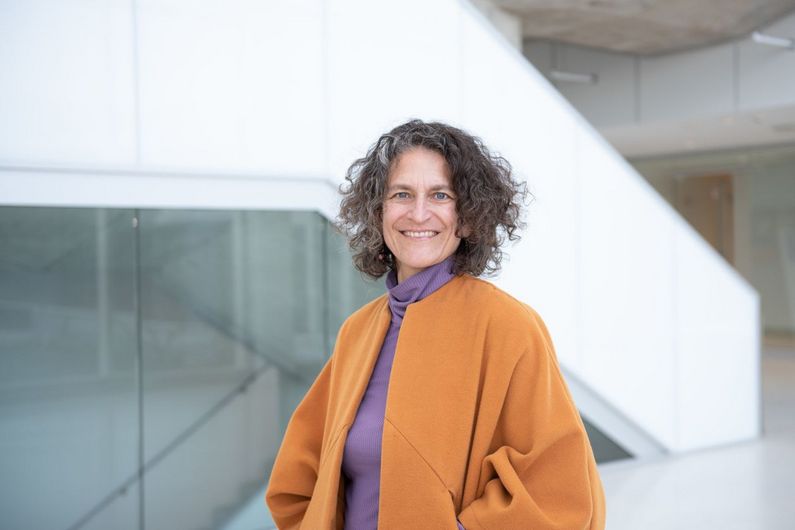'It really puts us on the map'
- UdeMNouvelles
05/07/2024
Katherine Frohlich talks about her new role shepherding over $8 million a year in federal funding for research as the new scientific director of Canada's Institute of Population and Public Health.
Across Canada, 13 scientific research institutes are funded by the Canadian Institutes of Health Research, the federal funding agency created in 2000. Each has an annual budget of about $8.4 million. And now one of them has an Université de Montréal professor at its head.
Katherine Frohlich started a four-year mandate as scientific director of the Institute of Population and Public Health (IPPH) last September, with the possibility of renewal for another four years starting in 2027.
Frohlich is a professor of health promotion in the Department of Social and Preventive Medicine of UdeM's School of Public Health (ESPUM), as well as an associate researcher at the UdeM-affiliated Centre for Public Health Research (CReSP).
The IPPH's mandate is to support research into the biological, social, cultural and environmental interactions that determine the health of people, communities and global populations; and to apply that knowledge through strategic partnerships and research funding programs.
Its overall goal is to improve people's health and promote health equity in Canada and globally through research and its application to policies, programs and practice in public health and other sectors.
Ahead of the Institute's official opening of its offices today at the ESPUM, we asked Frohlich - an interdisciplinary scholar whose expertise is in reducing social inequities in health for young people in cities - to speak about her new role.
You've been in your new job since September. What's been accomplished since then?
The last eight months have been full of a number of exciting events. First of all, we've hired my team: initially five new hires, with two more to come. Second, we've taken the 2022-26 strategic plan that I inherited from my predecessor, which prioritizes four areas of research - public-health systems, global public health, healthy cities and equity science - and given a little refresh to the latter, which we now call 'moving upstream' and which focuses on the structural determinants of health. And third, just in the last few months, we've come up with three new funding opportunities: one on climate justice; another on the structural determinants of health, for which we've already amassed $4 million in investment from other CIHR institutes; and another on healthy urban policy, which involves a workshop to be held in Helsinki in 2025. So, all in all, we've been really busy trying to get CIHR money into researchers' pockets and create excitment around new research initiatives.
What priorities do you anticipate will change in the course of your mandate?
It's a CIHR tradition that each new Institute director goes on a listening tour, crossing the country from coast to coast, listening to stakeholders at the universities and in local communities, and finding out where the gaps are, where researchers feel the money needs to go. I'll do that tour this fall or over the winter, and what we learn there will help us form the beginning of our new strategic plan, for 2027-31. We are planning for climate justice to play a big role; I've been advocating for research into the health effects of climate change even before I started my mandate, and know that there's a huge appetite for more research in that area, globally but also nationally. There are issues of food insecurity in the North with the Inuit, who depend on seal, caribou and other small animals to survive and enjoy food sovereignty, all of which is negatively affected by climate change. Similarly, in the South, heat exposure in the big cities is a major effect of climate change, disproportionately affecting older adults and the very young living in crowded areas with a lot of pavement and not much greenspace.
What will UdeM gain by having the Institute headquartered here for the next few years?
Exposure. The CIHR is to Canada what the National Institutes of Health is to the U.S., and having one of its institutes based here gives Université de Montréal an incredible spotlight as I cross the country and the world spreading its name. It really puts us on the map. But just as importantly, being here gives the university community direct access to me, on campus, to bring my knowledge of CIHR and government to anyone who asks. Of course, there are certain things I can't talk about before they happen, specific funding opportunities that will be opening up, but I can certainly share any of the knowledge that I have about how the system works, where we think we're going, what I think the new federal budget will mean for universities. It's a privileged relationship our community can - and should - enjoy. And one last thing people should know: despite being an anglophone, I'm a staunch defender of the French language, and I bring a very strong voice in defence of the French language in our meetings with colleagues from the rest of Canada. French is horribly neglected outside Quebec, I fight for it all the time, and it's easier for me to do that now that I'm running the Institute.
What is the general public to take away from the work of the IPPH?
We all know how important public health is now, thanks to the pandemic. Before COVID, most people had no idea what we do. And to further the development of public health, it's so important to have the money to fund research. With the right knowledge, we'll be able to quickly respond to the important public-health problems of our societies, to anticipate and find solutions for them, to innovate around these issues. In the end, it'll make us all, wherever we are, healthier and happier.













